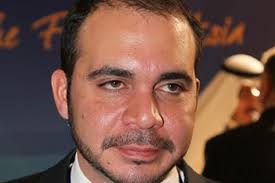By Andrew Warshaw
January 6 – Prince Ali bin al-Hussein, the Jordanian royal who has put his reputation on the line by taking a second stab at the FIFA presidency, has warned that if the wrong man is appointed to succeed Sepp Blatter, the organisation faces a catastrophic future.
As the five candidates step up their lobbying campaign with less than two months to go before the ballot, Prince Ali, at a media round table in London, said February 26 represents the last chance to clean up the organisation as he launched an updated manifesto.
“Everybody recognises this is the last chance in February to get it right. We don’t want a situation where two years down the line or a year down the line, again more scandals come out,” said Prince Ali.
“This is an incredibly important moment for the future of the organisation, in the upcoming election. It would be a catastrophe for the organisation if things do not go in the right way.”
Prince Ali was on the executive committee from 2011-15, sitting alongside several officials who have since been indicted by American prosecutors and/or banned by FIFA. Although he was beaten in May’s presidential election by Blatter, he believes many federations who voted for the veteran Swiss last time will swing his way now that the pressure is off.
Prince Ali made it clear that if elected he would want to harden some of the reform proposals that are up for approval at the electoral Congress. Ever since the raft of measures were made public last month, there has been a growing realisation that whoever becomes president might want to do things his own way and tweak some of the ideas presented by the FIFA Reform Group led by former Olympics guru Francois Carrard.
For example, Prince Ali believes in a limit of two four-year terms of office for both the president and members of the executive committee while the reform committee proposed a maximum of three terms. The reform proposals were “a good start,” said Prince Ali, “but don’t go far enough.”
“Two terms is enough if you are hard working and that includes the president. You have to be dedicated to roll up your sleeves and work on behalf of the 209 member assocations. It means being a hands-on president but with clear roles also for a proper ceo, secretary-general and so on . . . proper leadership and somebody who takes responsibility which is what we’ve not seen in the past.”
Prince Ali says his intention to be a hands-on leader differs to that of, say, South Africa businessman Tokyo Sexwale and Asian president Sheikh Salman bin Ebrahim Al Khalifa both of whom have indicated a preference for doing the job more like a non-executive chairman.
“If you are the president of the organisation, you have to take responsibility for that organisation,” Prince Ali explained. “I have seen in the past at FIFA, this whole idea of blaming others for what happens in the organisation. So I don’t want this organisation to go to a new level of irresponsibility.”
Although in future choosing World Cup hosts will be far more democratic and transparent, with FIFA’s entire membership having a vote rather than leaving it to an all-powerful elite, Prince Ali wants it to go further. For 2018 and 2022, the recommendations of the technical evaluation committee were widely ignored and Prince Ali says this has to stop. In fact he favours scrapping secret ballots altogether for both presidential elections and World Cup hosts.
“You base the decision on where to host the World Cup on what the evaluation team recommends. That is where it has to go. I don’t think it’s correct for executive committee members to be travelling to host nations. We don’t want to make the same mistakes we had in the past.”
With all the candidates blowing their respective trumpets, it’s not easy working out the current geo-politicial voting landscape. Prince Ali clearly believes he has a better chance than last time when he was beaten 133-73 but was at pains not to criticise fellow candidates, at least not overtly. He did, however, address the eight-year bans meted out to Blatter and Michel Platini over the infamous SFr2 million payment the UEFA president received from FIFA in 2011 for work supposedly carried out up to nine years earlier without a written contract.
“In this day and age, to have an oral agreement is totally irresponsible,” said Prince Ali. “You have to be open. It has to be accountable.”
Whilst in the UK, Prince Ali was meeting all four British associations as well as Damien Collins, who runs the NewFifaNow movement which has organised a planned forum of presidential candidates at the European Parliament in Brussels on January 27. It is far from clear, however, how many contenders will attend since Prince Ali himself has now had to pull out because of a prior commitment in Paraguay.
Contact the writer of this story at moc.l1745042398labto1745042398ofdlr1745042398owedi1745042398sni@w1745042398ahsra1745042398w.wer1745042398dna1745042398

